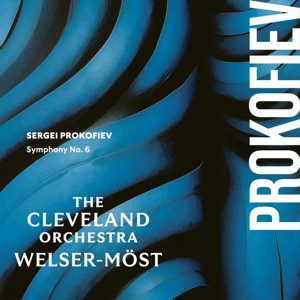
Sergei Prokofiev (1891–1953)
Symphony No. 6, Op. 111 (1947)
Cleveland Orchestra/Franz Welser-Möst
rec. 2023, Mandel Concert Hall, Cleveland, USA
The Cleveland Orchestra TCO0010 [42]
In a review of Prokofiev’s Sixth Symphony, published shortly after its premiere, Yuri Weinkop likened its curt introduction to the sound of a key turning a rusty door lock. To my ears, this dark-hued recording of the work by the Cleveland Orchestra provoked more alarming imagery, its razor-sharp brass cutting through like knives jabbing at the listener. Whatever similes one prefers to describe this and other moments in the work, the results here are impressive.
Franz Welser-Möst, the orchestra’s longtime music director, is a frustratingly random element on the podium; his conducting wavers between interpretive somnolence and commitment. Either, or; take it or leave it. Prokofiev’s Sixth, presented without companion on this recording compiled from a couple of concert performances, must have special personal significance to the conductor. (In my youth, he twice programmed it as a guest here in Los Angeles—and twice canceled.) He connects to it here with a rare sense of purpose that transcends everything, even the disappointingly insipid liner notes by Hugh MacDonald; it might be the conductor’s best work yet on records.
Variable though Welser-Möst may be as an interpreter, he undeniably has maintained the orchestra’s preeminent qualities of exacting precision and transparency, qualities that pair well with this symphony. Prokofiev’s emotional distance, too, finds in this orchestra and conductor understanding exponents. Their gradations of volume and color in the Sixth’s opening movement are judiciously built, then dissipated. Tension is preserved right through the coda, announced by fanfares and gong crashes that here punctuate the mood with unsettling question marks and subvert any hope for resolution.
The tragedy that hovers forebodingly in the opening movement is stated explicitly in the central Largo, one of Prokofiev’s most beautiful creations. Cleveland principal trumpetist Michael Sachs rings forth with doleful, bardic power in his solos that buttress the movement, which looks back longingly as much as to childhood and wartime sorrows as to the composer’s youthful “iron and steel” period.
Amidst the overt clowning of the finale, Welser-Möst and the Clevelanders keep their grip on the symphony’s ramping up of pressure, signaled by thumping bass drums and a lugubrious bass riff on the piano that recurs obsessively. They also impart a chrome luster to the movement’s sleek textures that sharpen its concealed rage. When this finally erupts in full cry before the coda, orchestra and conductor roar out a mighty statement that is not only this symphony’s climax, but perhaps that of Prokofiev’s late Soviet period. It leads to an exclamation of pyrrhic victory that on this recording is as dazzling as it is disquieting.
Néstor Castiglione
Buying this recording via the link below generates revenue for MWI, which helps the site remain free.


















